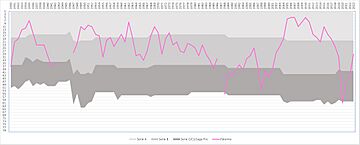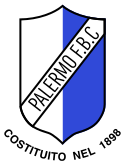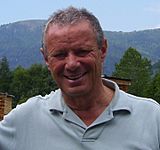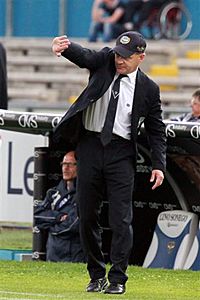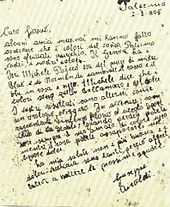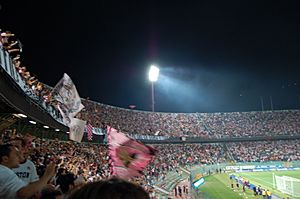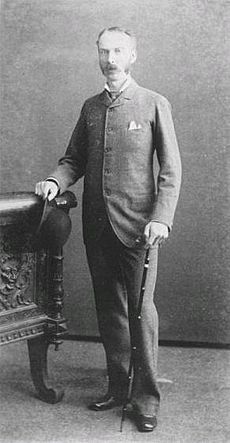Palermo FC facts for kids
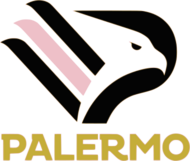 |
||||
| Full name | Palermo Football Club | |||
|---|---|---|---|---|
| Nickname(s) | I Rosanero (The Pink and Blacks) Le Aquile (The Eagles) |
|||
| Founded | 1 November 1900 as Anglo Palermitan Athletic and Football Club | |||
| Ground | Stadio Renzo Barbera | |||
| Capacity | 36,365 | |||
| Coordinates | 38°09′09.8″N 13°20′31.9″E / 38.152722°N 13.342194°E | |||
| Owner | City Football Group (94.94%) Hera Hora S.r.l. (5%) Associazione Amici Rosanero (0.06%) |
|||
| Chairman | Dario Mirri | |||
| Head coach | Filippo Inzaghi | |||
| League | Serie D Group I | |||
| 2018–19 | Serie B, 11th of 19 (resigned) | |||
|
||||
Palermo Football Club is a professional football team from Palermo, Sicily, Italy. They currently play in Serie B, which is a top league in Italy. The club is also part of the City Football Group.
The club was first started on November 1, 1900, as the Anglo Palermitan Athletic and Football Club. This makes Palermo one of Italy's oldest football teams.
Palermo has won the Coppa Italia Serie C once, in 1992–93. They have also won five Serie B league titles. The team reached the Coppa Italia final three times, in 1973–74, 1978–79, and 2010–11. They have played 29 seasons in Serie A, Italy's highest league.
In international competitions, Palermo has played in the UEFA Europa League (formerly UEFA Cup) five times.
Contents
Club History
Early Years (1898–1947)
There is some discussion about when the club was exactly founded. Some people think it might have been as early as 1898. However, the most common and official founding date is November 1, 1900. The club was named the Anglo Palermitan Athletic and Football Club.
A young man from Palermo, Ignazio Majo Pagano, is thought to have founded the club. He learned about football while studying in London. The first team had three Englishmen and nine local players. Their first recorded match on December 30, 1900, was a 5–0 loss to an amateur English team. Their first official win was 3–2 against Messina Football Club on April 18, 1901.
In 1907, the club changed its name to Palermo Foot-Ball Club. They also changed their team colors to the famous pink and black. From 1908 until 1915, Palermo played in the Lipton Challenge Cup. They won this competition three times against Naples FBC.
After World War I, the club was restarted in 1919 as Unione Sportiva Palermo. In the early 1920s, they played in the Campionato Lega Sud, a league in Southern Italy. They reached the semi-finals in 1924. The club faced money problems and closed in 1927. But it was reformed a year later by joining with another team, Vigor Palermo. They were then called Palermo FootBall Club.
The team was promoted to Serie B in 1930 and then to Serie A in 1932. When they joined Serie A, Palermo moved to a new stadium called Stadio Littorio. Today, this stadium is known as Stadio Renzo Barbera. Palermo played in Serie A until 1936.
From 1936 to 1940, the team was forced to change its colors to yellow and red by the government. In 1940, the club was removed from the Italian Football Federation because of money issues. A new club was formed by merging with Unione Sportiva Juventina Palermo. This new team, Unione Sportiva Palermo-Juventina, played in Serie C in 1941 and Serie B in 1942.
The club could not finish the 1942–43 season because of World War II. After the war, the club changed its name to US Palermo.
Post-War Years (1947–2002)
After World War II, Palermo returned to Serie A by winning the Serie B championship in 1947–48. Famous players like Čestmír Vycpálek joined the team. Palermo played in Serie A until 1954. After some changes, the club returned to Serie A in 1956. Palermo often moved between the top two Italian leagues. Many great players played for Palermo during this time, including Santiago Vernazza and Giuseppe Furino. In the 1961–62 season, Palermo finished eighth in Serie A, their best result at that time.
In 1970, Renzo Barbera became the new chairman of the club. After 1973, Palermo mostly stayed in Serie B. However, they reached the Italian Cup finals twice. They lost in 1974 to Bologna and in 1979 to Juventus. Barbera left the club in 1980. Palermo was relegated to Serie C1 four years later.
In 1986, Palermo FBC was removed from the football federation due to financial problems. After a year without professional football, the club was re-founded in 1987. They started playing in Serie C2 and quickly won promotion.
In the 1990s, Palermo moved between Serie B and Serie C1. In March 2000, Franco Sensi, the chairman of Roma, bought Palermo. Palermo was promoted to Serie B in 2001 after a thrilling end to the season. They finished above their rivals Messina.
The Zamparini Era: Back to Serie A and European Football (2002–2013)
In 2002, businessman Maurizio Zamparini bought Palermo. He wanted to bring the club back to Serie A and make it a regular team in European competitions. Palermo almost reached Serie A in 2002–03. They finally achieved it in the 2003–04 season, winning the Serie B championship. This was after 31 years away from Serie A. Francesco Guidolin was the coach who led them to this success.
The 2004–05 season was Palermo's first in Serie A since 1973. They finished in an excellent sixth place, which meant they qualified for the UEFA Cup for the first time. Luca Toni set a club record by scoring 20 league goals in Serie A. The next season, Palermo reached the last 16 in the UEFA Cup and the Coppa Italia semi-finals. They qualified for the UEFA Cup again because of the 2006 Calciopoli scandal. Several Palermo players, including Andrea Barzagli and Fabio Grosso, won the 2006 FIFA World Cup that year.
Palermo started the 2006–07 season very well. However, a long period without wins caused them to drop in the league. They finished fifth, qualifying for the UEFA Cup again. The club became a strong team in the middle of the Serie A table. They also won a national youth title in 2009.
The 2010–11 season saw Palermo return to European football in the UEFA Europa League. Palermo reached their third Coppa Italia final after beating Milan. They lost 3–1 to Internazionale in the final. This was a highlight of Zamparini's time at the club.
Later Years and Serie B Return (2011–2018)
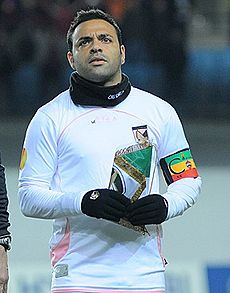
For the 2011–12 season, Stefano Pioli became the coach. But he was fired before Serie A started after the team was knocked out of the Europa League. Devis Mangia took over and led Palermo to fifth place with many home wins. However, a series of bad results led to his replacement by Bortolo Mutti. Palermo finished 16th that season.
In 2012–13, Palermo had many changes in staff and coaches. The team finished 18th and was relegated to Serie B after nine seasons in Serie A.
For the new Serie B season, Gennaro Gattuso, a former Italy star, became the manager. He was fired in September 2013. However, Palermo quickly improved under new coach Giuseppe Iachini. They won promotion back to Serie A for the 2014–15 season. Palermo set a new Serie B record with 86 points.
In the 2014–15 Serie A season, Palermo played well. They almost qualified for the UEFA Europa League, thanks to their Argentine strikers Paulo Dybala and Franco Vázquez.
The 2015–16 season was difficult. Palermo sold Dybala to Juventus. The team had many coaching changes (seven in total). They avoided relegation on the very last day of the league season.
For the 2016–17 season, many key players were sold. The team struggled, and there were more coaching changes. On February 27, 2017, Zamparini stepped down as chairman after 15 years. Palermo finished 19th and was relegated to Serie B.
Palermo aimed to return to Serie A in the 2017–18 Serie B season. They started well and were in first place at the halfway point. But a series of bad results meant they lost in the playoff finals to Frosinone.
New Owners and Financial Issues (2018–2019)
For the 2018–19 Serie B season, Palermo had to sell many players due to money problems. In November 2018, a London-based group, Sport Capital Group Investments Ltd., bought the club. However, the new owners soon resigned, saying they were not told the full extent of the club's financial issues.
The club was then bought by Daniela De Angeli and Rino Foschi. They later sold it to Arkus Network S.r.l. At the end of the 2018–19 Serie B season, Palermo finished third. But they were moved to last place by the FIGC (Italian Football Federation) due to serious financial problems. This meant relegation to Serie C. The club appealed, and the penalty was changed to a 20-point deduction. This placed them in eleventh position.
However, on June 24, 2019, Palermo failed to provide proof of a valid insurance policy for the new season. This is a very serious violation of Italian law. As a result, on July 12, 2019, the FIGC removed the club from all professional leagues.
A Fresh Start: City Football Group (2019–Present)
On July 23, 2019, the Mayor of Palermo, Leoluca Orlando, announced that a new club would be formed. This new club, named "Hera Hora srl," was owned by Dario Mirri and Tony DiPiazza. Palermo played in Serie D, the highest level of non-professional football, for the 2019–20 season. They finished first and were promoted to Serie C. This happened after all amateur leagues stopped in March 2020 due to the COVID-19 pandemic. On July 16, 2020, the club officially changed its name to Palermo Football Club.
Under coach Silvio Baldini, Palermo finished third in their group in the 2021–22 Serie C season. They then won the promotion playoffs against Padova, returning to Serie B on June 12, 2022. This was just three years after being removed from the league.
On July 4, 2022, the City Football Group, which owns Manchester City F.C., bought Palermo. Dario Mirri remained as club chairman. Under new coach Eugenio Corini, Palermo finished ninth in the 2022–23 season. They just missed out on the promotion playoffs. The next season, Palermo aimed for direct promotion. However, inconsistent results led to Corini's dismissal and Michele Mignani becoming the new coach.
Team Colors and Badge
|
|
| Palermo's original red-blue kit, worn from 1900 until 1907. |
The current official badge, from 2019, shows a white eagle's head and three pink/black feathers inside a black letter 'P'. The eagle is a symbol of the city of Palermo. This new badge replaced the older one, which had an eagle ready to fly and the words "U.S. Città di Palermo".
When the club was founded, Palermo originally played in red and blue shirts. But on February 27, 1907, they changed to the unique pink and black colors. This happened when they also changed their name to "Palermo FootBall Club".
Count Giuseppe Airoldi, one of the club's founders, suggested the pink and black colors. In a letter from 1905, he called pink and black "colors of the bitter and the sweet." He joked that these colors suited a team with "results as up and down as a Swiss clock." He also noted that red and blue were very common colors for teams in Italy.
The club had to wait three months for their new jerseys. There was no pink cotton material available in Palermo, so it had to be imported from England. The new pink and black shirts were first worn in a friendly match against Sir Thomas Lipton's crew team. Palermo won that match 2–1.
From 1936 to 1940, the team was forced to play in red and yellow jerseys. These were the official colors of the city of Palermo, and the change was ordered by the government at the time. When the club was refounded in 1941, they first wore light blue shirts. But they switched back to the popular pink and black colors just one year later.
Stadium: Stadio Renzo Barbera
Palermo plays its home matches at Stadio Renzo Barbera. The stadium opened in 1932 and was first called Stadio Littorio. The first match, which Palermo won 5–1, was played on January 24, 1932, against Atalanta. In 1936, the stadium was renamed Stadio Michele Marrone.
Initially, the stadium had a running track and no seating behind the goals. In 1948, after World War II, the stadium was renamed Stadio La Favorita. It was also changed to remove the running track and add two curved sections, increasing its capacity to 30,000. In 1984, it was made even bigger, to 50,000 seats. This new capacity was only reached twice.
For the 1990 FIFA World Cup, the stadium was renovated. Some new seats were added, but the total capacity was reduced to 37,619. In 2002, the stadium was renamed in honor of Renzo Barbera, a famous Palermo chairman from the 1970s.
In 2024, Palermo opened its own training center in the city of Torretta. This was the first training center in the club's history.
Supporters
Most Palermo supporters come from the city and nearby areas. However, Palermo is also very popular across Western Sicily. Many Sicilian immigrants in northern Italy also support the team. For example, some Palermo fans in Germany even started a club called FC Rosaneri in honor of Palermo.
Supporting Palermo is often linked to a strong sense of Sicilian identity. It's common to see Sicilian flags waved by fans during matches. Palermo fans also have a friendship with Lecce ultras (passionate fans). This friendship grew stronger because of Fabrizio Miccoli. He is from Lecce and became Palermo's captain and most successful goal scorer.
Palermo's biggest rivals are fellow islanders Catania. Matches between Palermo and Catania are called Sicilian derbies. There is also another Sicilian team, Messina, but the rivalry with Catania is usually more intense.
A match between Palermo and Catania on February 2, 2007, is remembered because a policeman was injured during problems between fans.
According to a 2008 survey, Palermo has about 1.47 million fans in Italy. This places them among the top ten most supported Italian teams. For example, at the 2011 Coppa Italia Final in Rome, it was estimated that 25,000 to 35,000 Palermo fans were present. They easily outnumbered the fans of the opposing team, Inter Milan.
Players
Current Squad
|
|
Palermo Primavera
|
|
Players on Loan
|
|
Famous Former Players
In 2020, for the club's 120th anniversary, Palermo created a Hall of Fame. Fans voted for their favorite players and a manager.
The players who received the most votes were:
 Fabrizio Miccoli
Fabrizio Miccoli Eugenio Corini
Eugenio Corini Javier Pastore
Javier Pastore Federico Balzaretti
Federico Balzaretti Andrea Barzagli
Andrea Barzagli Josip Iličić
Josip Iličić Paulo Dybala
Paulo Dybala Luca Toni
Luca Toni Fabio Grosso
Fabio Grosso Amauri
Amauri Edinson Cavani
Edinson Cavani
Club Officials
Managers
In 2020, as part of the club's 120th anniversary, fans voted for the best manager in Palermo's history.
The best manager chosen was Francesco Guidolin. He led Palermo to win promotion to Serie A in 2004 after 31 years. He also guided them to their best-ever Serie A finish (fifth place) and their first European qualification.
Other managers who were candidates for this honor included:
Club Chairmen
Over the years, Palermo has had many different chairmen. Here is a list of some of the known chairmen:
 Edward De Garston (1900–1903)
Edward De Garston (1900–1903) Barone Michele Vannucci (1903–1904)
Barone Michele Vannucci (1903–1904) Cavaliere Ignazio Majo Pagano (1904–1908)
Cavaliere Ignazio Majo Pagano (1904–1908) Barone Roberto Pottino (1908–1915)
Barone Roberto Pottino (1908–1915) Valentino Colombo (1920–1923)
Valentino Colombo (1920–1923) Cavaliere Michele Utveggio (1923–1925)
Cavaliere Michele Utveggio (1923–1925) Valentino Colombo (1925–1926)
Valentino Colombo (1925–1926) Conte Liotta di Lemos (1928)
Conte Liotta di Lemos (1928) Barone Giovanni Sergio (1928)
Barone Giovanni Sergio (1928) Conte Guido Airoldi (1928–1929)
Conte Guido Airoldi (1928–1929) Barone Luigi Bordonaro di Gebbiarossa (1929–1931)
Barone Luigi Bordonaro di Gebbiarossa (1929–1931) Francesco Paolo Barresi (1931–1933)
Francesco Paolo Barresi (1931–1933) Cavaliere Giovanni Lo Casto Valenti (1933–1934)
Cavaliere Giovanni Lo Casto Valenti (1933–1934) Valentino Colombo (1934–1935)
Valentino Colombo (1934–1935) Giovanni De Luca (1935)
Giovanni De Luca (1935) Luigi Majo Pagano (1935–1936)
Luigi Majo Pagano (1935–1936) Valentino Colombo (1936–1937)
Valentino Colombo (1936–1937) Paolo Di Pietra (1937–1938)
Paolo Di Pietra (1937–1938) Salvatore Barbaro (1938–1940)
Salvatore Barbaro (1938–1940) Duilio Lanni (1941–1942)
Duilio Lanni (1941–1942) Giuseppe Agnello (1942–1947)
Giuseppe Agnello (1942–1947) Stefano La Motta (1947–1948)
Stefano La Motta (1947–1948) Giuseppe Guazzardella (1948–1951)
Giuseppe Guazzardella (1948–1951) Raimondo Lanza di Trabia (1951–1952)
Raimondo Lanza di Trabia (1951–1952) Barone Carlo La Lomia (1952–1953)
Barone Carlo La Lomia (1952–1953) Mario Fasino (1953–1954)
Mario Fasino (1953–1954) Ernesto Pivetti (1954–1955)
Ernesto Pivetti (1954–1955) Giuseppe Trapani (1955)
Giuseppe Trapani (1955) Conte Arturo Cassina (1955–1956)
Conte Arturo Cassina (1955–1956) Giuseppe Seminara (1956–1957)
Giuseppe Seminara (1956–1957) Casimiro Vizzini (1957–1963)
Casimiro Vizzini (1957–1963) Conte Guglielmo Pinzero (1963–1964)
Conte Guglielmo Pinzero (1963–1964) Ernesto Di Fresco,
Ernesto Di Fresco,  Luigi Barbaccia,
Luigi Barbaccia,  Franz Gorgone (1964)
Franz Gorgone (1964) Casimiro Vizzini (1964)
Casimiro Vizzini (1964) Conte Guglielmo Pinzero (1964)
Conte Guglielmo Pinzero (1964) Totò Vilardo (1964–1965)
Totò Vilardo (1964–1965) Franco Spagnolo (1965)
Franco Spagnolo (1965) Franz Gorgone (1965)
Franz Gorgone (1965) Luigi Gioia (1965)
Luigi Gioia (1965) Giuseppe Pergolizzi (1967–1970)
Giuseppe Pergolizzi (1967–1970) Renzo Barbera (1970–1980)
Renzo Barbera (1970–1980) Gaspare Gambino (1980–1982)
Gaspare Gambino (1980–1982) Roberto Parisi (1982–1985)
Roberto Parisi (1982–1985) Salvatore Matta (1985–1986)
Salvatore Matta (1985–1986) Salvino Lagumina (1987–1989)
Salvino Lagumina (1987–1989) Giovanni Ferrara (1989–1993)
Giovanni Ferrara (1989–1993) Liborio Polizzi (1993–1995)
Liborio Polizzi (1993–1995) Giovanni Ferrara (1995–2000)
Giovanni Ferrara (1995–2000) Sergio D'Antoni (2000–2002)
Sergio D'Antoni (2000–2002) Maurizio Zamparini (2002–2017)
Maurizio Zamparini (2002–2017)
 Paul Baccaglini (2017)
Paul Baccaglini (2017) Giovanni Giammarva (2017–2018)
Giovanni Giammarva (2017–2018) Clive Richardson (2018–2019)
Clive Richardson (2018–2019) Rino Foschi (2019)
Rino Foschi (2019) Alessandro Albanese (2019)
Alessandro Albanese (2019) Dario Mirri (2019–)
Dario Mirri (2019–)
Club Achievements
Palermo has won several titles throughout its history:
- Serie B
- Champions (5): 1931–32, 1947–48, 1967–68, 2003–04, 2013–14
- Serie C1
- Champions (4): 1941–42, 1945–46, 1992–93, 2000–01
- Serie C2
- Champions (1): 1987–88
- Serie D
- Champions (1): 2019–20
- Prima Divisione
- Champions (1): 1929–30
- Coppa Italia Serie C
- Winners (1): 1992–93
Other Trophies
- Coppa Federale Siciliana
-
- Winners (1): 1920
- Whitaker Challenge Cup
-
- Winners (1): 1908
- Lipton Challenge Cup
-
- Winners (5): 1910, 1912, 1913, 1914, 1915
- Torneo di Tunisi
- Winners (1): 1923
- Campionato Primavera (Youth League):
- Winners (1): 2008–09
- Campionato Nazionale Dante Berretti (Youth League):
- Winners (1): 2000–01
- Coppa Allievi Professionisti (Youth Cup):
- Winners (1): 1997–98
- Campionato Giovanissimi Regionali (Youth League):
- Winners (2): 2011–12, 2012–13
Club Records
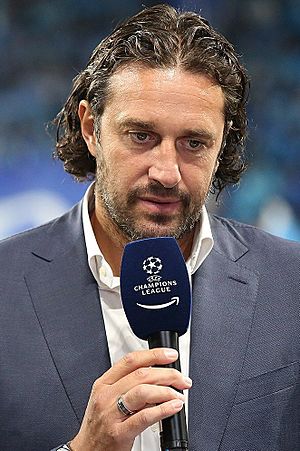
- Most appearances in all competitions – 373, Roberto Biffi (1988–1999)
- Most Serie A league appearances – 165, Fabrizio Miccoli (2007–2013)
- Most league goals – 74, Fabrizio Miccoli (2007–2013)
- Most goals in all competitions – 81, Fabrizio Miccoli (2007–2013)
- Most goals in a season – 30, Luca Toni (2003–2004)
- Current player with most appearances – 156, Matteo Brunori (as of April 12, 2025)
- Biggest win in Serie A – 8–0 (vs. Pro Patria, November 5, 1950)
- Biggest away win – 8–1 (vs. Potenza, March 1, 1942)
- Biggest defeat – 0–9 (vs. Milan, February 18, 1951)
- Biggest home defeat – 0–7 (vs. Udinese, February 27, 2011)
- Highest points in Serie A – 65 points (2009–10 season), finishing 5th.
- Longest unbeaten streak at home – 31 matches (from April 10, 2021, to August 13, 2022)
- Longest winning streak in Serie A – 5 matches (in 1961–62 and 2006–07 seasons)
Competitions Played
League History
Palermo has played in different Italian football leagues over the years:
| Level | Category | Participations | Debut | Last season | Moves |
A |
Serie A | 29 | 1932–33 | 2016–17 | |
B |
Serie B | 46 | 1930–31 | 2023–24 | |
C |
Prima Divisione | 1 | 1929–30 | ||
| Serie C | 3 | 1941–42 | 2021–22 | ||
| Serie C1 | 9 | 1984–85 | 2000–01 | ||
| Serie C2 | 1 | 1987–88 | |||
| 87 out of 90 years of professional football in Italy since 1929 | |||||
|---|---|---|---|---|---|
D |
Serie D | 1 | 2019–2020 | ||
National Cups
| Competition | Participation | Debut | Last season |
| Coppa Italia | 63 | 1935–36 | 2016–17 |
| Coppa Italia Serie C | 10 | 1984–85 | 2000–01 |
| Supercoppa di Serie C | 1 | 2000–01 | 2000–01 |
International Competitions
| Category | Participations | Debut | Last season |
| Europa League ex UEFA Cup |
5 | 2005–06 | 2011–12 |
| Mitropa Cup | 2 | 1960 | 1968–69 |
| Coppa delle Alpi | 1 | 1960 | 1960 |
Palermo in Europe
UEFA Cup / UEFA Europa League Matches
| Season | Round | Opposition | Home | Away | Aggregate | Reference |
|---|---|---|---|---|---|---|
| 2005–06 | First round | 2–1 | 4–0 | 6–1 | ||
| Group B | N/A | 2–1 | 1st | |||
| 0–0 | N/A | |||||
| N/A | 1–1 | |||||
| 3–0 | N/A | |||||
| Round of 32 | 1–0 | 1–2 | 2–2 (a) | |||
| Round of 16 | 1–0 | 0–3 | 1–3 | |||
| 2006–07 | First round | 3–0 | 1–0 | 4–0 | ||
| Group H | N/A | 2–1 | 4th | |||
| 0–1 | N/A | |||||
| N/A | 0–3 | |||||
| 1–1 | N/A | |||||
| 2007–08 | First round | 0–1 (aet) | 1–0 | 1–1 (2–4 p) | ||
| 2010–11 | Play-off round | 3–0 | 2–3 | 5–3 | ||
| Group F | 2–2 | 2–3 | 3rd | |||
| 1–0 | 1–0 | |||||
| 0–3 | 1–3 | |||||
| 2011–12 | Third qualifying round | 2–2 | 1–1 | 3–3 (a) |
See also
 In Spanish: Palermo Football Club para niños
In Spanish: Palermo Football Club para niños


